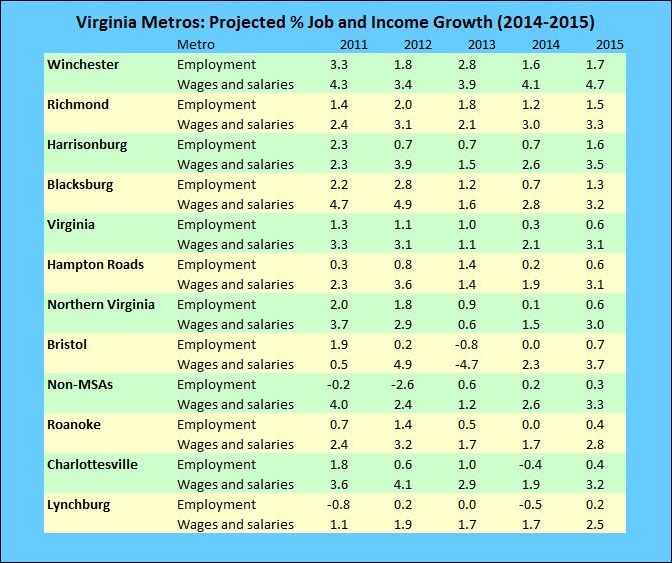It looks like another year of sub-par economic growth for Virginia, according to The Thomas Jefferson Institute for Public Policy’s “Virginia Economic Forecast 2015.” Sequestration and the resulting taming of federal government spending is doing the overall U.S. economy no harm — expected annual national growth of 2.3% in 2014 and 3.3% in 2015 is the strongest since the Great Recession ended six years ago. But federal spending cuts are concentrated geographically in the Washington capital region, and much of the fallout is being felt in Virginia, especially in the defense-dependent economies of Northern Virginia and Hampton Roads.
Meanwhile, Virginia’s smaller metros continue to lag the recovery, as do many small metros around the country not benefiting from the energy boom. (It will be interesting to see how energy-boom communities perform next year with oil at $50 per barrel.)
in Virginia, Winchester leads the way. (I’m not sure why, so I don’t have much to add).
Among the major metro regions, Richmond is the slow-but-steady tortoise that keeps plugging along at a middle-of-the-road pace nationally — enough to make it a top performer in Virginia. It’s not evident from the top-line growth figures but I see the change on the ground-floor level: The region is reinventing itself. Although Richmond is never likely to become a boom town, I do expect to see the region emerge as a region capable of sustained, faster-than-average growth in the years ahead.
The big question mark is Northern Virginia. How rapidly can the region with the greatest concentration of brainpower and high-tech industry in Virginia wean itself from dependency upon the federal government? Can companies transition from the arcane and stifling culture of government contracting to a more free-wheeling, entrepreneurial culture? Under the radar screen, there are a lot of positive signs. The future doesn’t reside in established Beltway Bandit contractors but in a slew of new start-ups. Once the contraction in government spending eases, I expect Northern Virginia to resume its growth leadership.
Without strong defense spending, Hampton Roads seems destined to be a laggard. The port and tourism industries just aren’t powerful enough to carry the entire region with it. Despite incredible quality-of-life advantages, the region is having difficulty reinventing itself.
Then there’s small metro/non-metro Virginia. Roanoke, Charlottesville and Lynchburg continue to struggle. I don’t understand what’s happening in Charlottesville. The University of Virginia doesn’t seem to have the same power to transform the local economy that Blacksburg does in the isolated New River Valley. Meanwhile, Virginia’s mill-town economy, as epitomized now by Lynchburg — Danville has hit such hard times that it no longer ranks as a metropolitan region — seems destined to continue its long, slow slide to oblivion. I hope I’m wrong about that, but I see no evidence to contradict me.
— JAB



